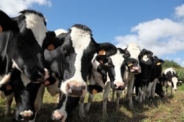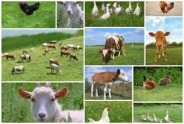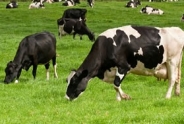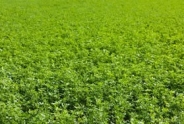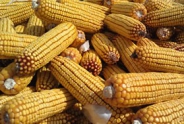Soil
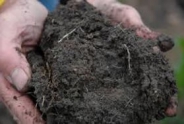 Effectively managing the soils of western New York for long-term productivity and sustainability is the foundation for crop production in New York's bread basket. This page contains resources and information to help farmers manage their soils and the nutrients used to grow their crops.
Effectively managing the soils of western New York for long-term productivity and sustainability is the foundation for crop production in New York's bread basket. This page contains resources and information to help farmers manage their soils and the nutrients used to grow their crops.A wide range of soils are farmed in western New York. Heavy clays sit on limestone bedrock along the Niagara Escarpment in Niagara and Orleans counties. Southern Wyoming, Livingston, Yates, and Seneca counties have acidic glacial loams. Highly productive loam soils are alongside heavy clays and gravelly sands, throughout the region and sometimes even in the same field. Muck soils naturally contain high levels of organic matter, while mineral soils vary greatly in their organic matter content depending on management history. Practices that increase soil health and productivity such reduced tillage, cover cropping, tile drainage, and diverse crop rotations continue to be adopted by western New York farmers.
Western New York farmers have been very proactive by adopting practices such as manure injection, nutrient management planning, split fertilizer applications, conservation tillage, and precision nutrient management in order to protect the natural resources they live near while increasing their productivity. While many farms make use of manure which contains many nutrients, farmers also typically apply nitrogen, phosphorous, potassium, and sulfur fertilizers along with lime to their fields. These fertilizers are placed with the crop seed as a "pop-up", 2 inches to the side and below the seed as a "starter", deep banded with tillage equipment, broadcasted on the soil surface, and occasionally applied as a foliar fertilizer. On-farm research by the NWNY Team continues to help farmers fine-tune their fertilizer applications to their crop rotations and tillage systems.
SOIL CATEGORIES
Dung Beetles in Pastures
Reducing the Risk of Compaction When Grazing Cover Crops
Nancy Glazier, Small Farms & Livestock Specialist
Northwest New York Dairy, Livestock & Field Crops

The benefits of cover crops have been known for many
years; one is remediating compaction.
Crop Alert
Mike Stanyard, Field Crops & IPM Specialist
Northwest New York Dairy, Livestock & Field Crops

Timely observations, information, and control strategies for managing pests, fertility, and current conditions on northwestern NY farms.
Forage Congress - Presentations
Nancy Glazier, Small Farms & Livestock Specialist
Northwest New York Dairy, Livestock & Field Crops

New to the NWNY Team's lineup this winter was Forage Congress at the Genesee River Restaurant and Reception Center in Mount Morris, NY.
This event covered timely topics recommended by the region's producers. The morning's session began with an overview of the cropping plan from the ground up, economics of high fiber digestibility, and new alfalfa varieties with quality grasses. The afternoon covered double cropping with winter triticale and options for properly storing silages.
Entry Point Precision Ag Technology: Benefits & Costs for Decision Making
John Hanchar, Farm Business Management Specialist
Northwest New York Dairy, Livestock & Field Crops

Two benefits attributed to auto steer mentioned frequently by producers and their advisors are reduced stress and reduced fatigue. Combine these benefits with expected favorable economic and financial impacts, and auto steer has the potential to be a beneficial change in practice for farmers, one that farmers will likely want to evaluate for their business.
Manure Injection vs. Surface Application
John Hanchar, Farm Business Management Specialist
Northwest New York Dairy, Livestock & Field Crops

Owners of dairy farm businesses face numerous challenges as they manage manure to meet financial, environmental, and other farm business objectives; trade-offs and conflicting objectives describe the situation. What is the expected change in profit associated with the change to manure injection from surface applicatin followed by incorporation?
Crop Cam
Mike Stanyard, Field Crops & IPM Specialist
Northwest New York Dairy, Livestock & Field Crops

Tune in as the NWNY Teams' Extension agronomists put on their GoPro cameras and head to the field.
Cover Crop Options in 2015
Mike Stanyard, Field Crops & IPM Specialist
Northwest New York Dairy, Livestock & Field Crops

Winter grain harvest should be just about wrapped up. That leaves a lot of open ground out there to plant some cover crops. We also ended up with quite a few prevented planting corn and soybean acres this spring. Some of that ground will go into winter small grains like wheat, rye and barley this fall. If you do not grow winter grains in your rotation, it is a good opportunity to get that ground covered up. There is also an opportunity to grow some more forage acres. This wet growing season has not been stellar for corn production. Crops like sorghum, forage oats and triticale can help fill in some of those forage losses. The past couple of years have shown us that the first half of August has been the optimal planting window for success of most cover crops.
Pop-Up and Starter Fertilizers in Corn and Soybeans
Bill Verbeten, Field Crops
Northwest New York Dairy, Livestock & Field Crops

Curious about applying pop-up or starter fertilizer to corn and soybeans? Check out this AgFocus article from May of 2013.
Proposed FAA Drone Rules Released
Bill Verbeten, Field Crops
Northwest New York Dairy, Livestock & Field Crops

On Sunday February 15th, 2015 the FAA released it's proposed rules for commercial unmanned aerial systems (UAS), commonly called drones, for public comment for 60 days. A summary can be found in the PDF below.
FAQs about Farm Drones
Bill Verbeten, Field Crops
Northwest New York Dairy, Livestock & Field Crops

Have a question about using an unmanned aerial system (UAS) on your farm? Not sure what is and isn't legal for drone use on your land? Check out this PDF for more information.
Safely Handling & Storage of Anhydrous Ammonia
Bill Verbeten, Field Crops
Northwest New York Dairy, Livestock & Field Crops

Thinking about using anhydrous ammonia? Be sure to download and read this safety fact sheet first before buying, handling, storing, or applying this fertilizer.
Upcoming Events
2026 Soybean & Small Grains Congress
February 11, 2026
Henrietta, NY
Participant Registration for the 2026 Soybean & Small Grains Congress NOW OPEN!
2026 Forage Congress
March 12, 2026
Nunda, NY
Due to the unprecedented winter storm that recently impacted travel conditions across the region and U.S., combined with extreme cold temperatures and associated safety concerns, Forage Congress was postponed out of an abundance of caution. This decision was made with the safety of our participants, speakers, staff, and venue partners as the highest priority.
We are pleased to officially announce that Forage Congress has been rescheduled for Thursday, March 12, 2026, and will be held at The Nunda Ranch as originally planned.
Address: 2278-NY 436, Nunda, New York 14517
Sponsorship opportunities, vendor participation, and event registration are now open. We are excited to reconvene this important educational program and look forward to welcoming producers, industry partners, and speakers for a full day of applied, research-based forage systems programming.
From Dry to Fresh: Transition Cow Management Training
March 12, 2026
Albion, NY
This is a 1-day hands-on training in transition cow management offered in English and Spanish.

